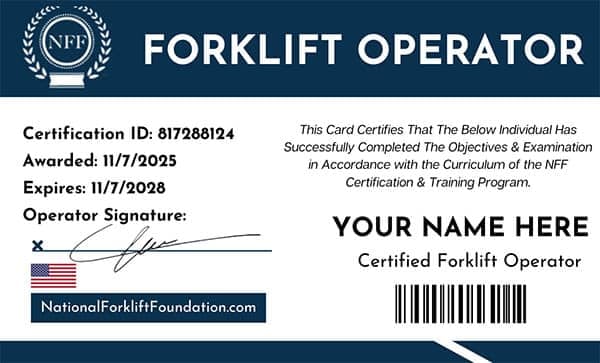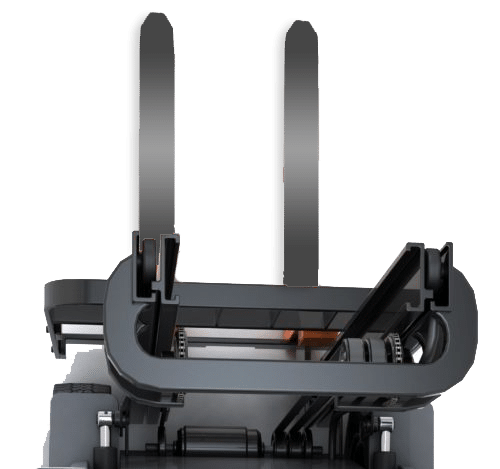Wilkes-Barre is reinventing its industrial core. With freight corridors along PennDOT’s I-81 spine, fast access to the Wilkes-Barre/Scranton International Airport (AVP), and expanding logistics parks from Pittston to Hanover, employers need operators who can move product safely and efficiently—around the clock. That’s why more teams here standardize on OSHA-compliant forklift training from the National Forklift Foundation (NFF): it’s credible, flexible, and built for real-world warehouse and manufacturing conditions.
Credibility with nationwide acceptance
NFF’s curriculum aligns to the federal OSHA Powered Industrial Trucks (PIT) standard, so your certificate travels with you—from a DC off City of Wilkes-Barre industrial corridors to regional hubs across Pennsylvania. That portability matters in a labor market served by the Greater Wilkes-Barre Chamber of Business & Industry and the broader Luzerne County economy, where manufacturers, 3PLs, and food processors scale up seasonally and shift crews among sites.
Because NFF’s training is recognized by employers nationwide, HR teams can screen faster and onboard with confidence. Whether you’re applying at a facility in CenterPoint Commerce & Trade Park, a cold-chain warehouse along the I-81 corridor, or a production floor supported by NEPIRC, a nationally accepted certificate signals you understand safe truck operation, load stability, and site protocols.
Online accessibility & scheduling flexibility
Wilkes-Barre runs on multiple shifts. NFF’s online theory lets candidates complete classroom content on their own time—ideal for students at Wilkes University, King’s College, Luzerne County Community College, or Penn State Wilkes-Barre who are stacking credentials while working. Employers can cohort new hires without shutting down lines, then complete the required hands-on evaluations in-house on their actual aisles, docks, and ramps.
If you’re coordinating transportation or supportive services, tap regional partners like PA CareerLink® Luzerne County, the NEPA Alliance, and the Chamber’s workforce initiatives to align training with hiring timelines.
OSHA-aligned structure—what local facilities expect
NFF covers the core topics safety managers around Wilkes-Barre prioritize:
- Truck classes & attachments (sit-down/stand-up counterbalance, reach, order picker, clamp)—common across AVP-area DCs.
- Load handling, stability triangles, and center of gravity—critical for high-bay storage prevalent in regional parks.
- Pedestrian, dock, trailer, and yard rules—integrated with shipping/receiving SOPs and OSHA 1910 requirements.
- Battery charging & LPG exchange—ventilation, eyewash, and fire code considerations supported by Luzerne County Emergency Management.
- Pre-shift inspections, incident reporting, and refresher triggers—aligned with PA Department of Labor & Industry guidance.
After e-learning, operators demonstrate proficiency on your site under your conditions—wet ramps in winter, congested cross-docks near intermodal freight, or tight pick modules serving e-commerce lines.
Compliance & safety dividends for Wilkes-Barre employers
For operations leaders, OSHA compliance is table stakes; performance is the win. Standardized training supports lower incident rates, fewer product damages, and stronger audit trails. It can also bolster insurance negotiations and customer audits—especially for facilities serving healthcare networks like Geisinger Wyoming Valley Medical Center or Wilkes-Barre General Hospital that expect rigorous safety cultures from suppliers.
Need to move freight quickly to rail or air? Coordination with Norfolk Southern Intermodal (Taylor) and AVP cargo tenants rewards facilities that minimize downtime. Competent PIT operators keep loads moving and dwell times down.
Local talent pipeline—train, hire, and advance
Wilkes-Barre’s education and business ecosystems make it easy to pair NFF certification with broader career pathways. Students can stack forklift credentials with manufacturing, supply chain, or OSHA outreach coursework through LCCC Continuing Education or university programs. Jobseekers can plug into employer networks via the Chamber, PA CareerLink®, and municipal postings at the City of Wilkes-Barre.
Hiring managers can widen reach through regional industry groups and civic partners—NEPA Alliance, Luzerne County Government, and CenterPoint tenant councils—to source certified candidates quickly during peak seasons.
Practical next steps for Wilkes-Barre teams
- Enroll operators with an OSHA-aligned provider: Start the online theory through the National Forklift Foundation, then schedule on-truck evaluations on your floor.
- Map training to compliance artifacts: Keep inspection sheets, evaluation records, and refresher logs organized for OSHA and customer audits; consult OSHA PIT and PA L&I resources.
- Leverage workforce programs: Post roles and explore grants/OJT through PA CareerLink® and Chamber workforce services.
- Build supervisor capacity: Upskill leads via local offerings at LCCC, Wilkes, or King’s (safety leadership, lean warehousing, quality).
Why this matters for Wilkes-Barre
From downtown revitalization to growth across the valley’s industrial parks, Wilkes-Barre competes on speed, safety, and reliability. OSHA-compliant forklift certification from the National Forklift Foundation helps operators and employers deliver on all three—while aligning with local expectations from City Hall, County government, and regional economic partners. As demand accelerates, crews that standardize on recognized training will scale faster, operate safer, and win more business.
Explore permits, safety, and workforce services through the City of Wilkes-Barre, Luzerne County, and the Greater Wilkes-Barre Chamber—then equip your team with OSHA-aligned certification that keeps people safe and freight moving.






